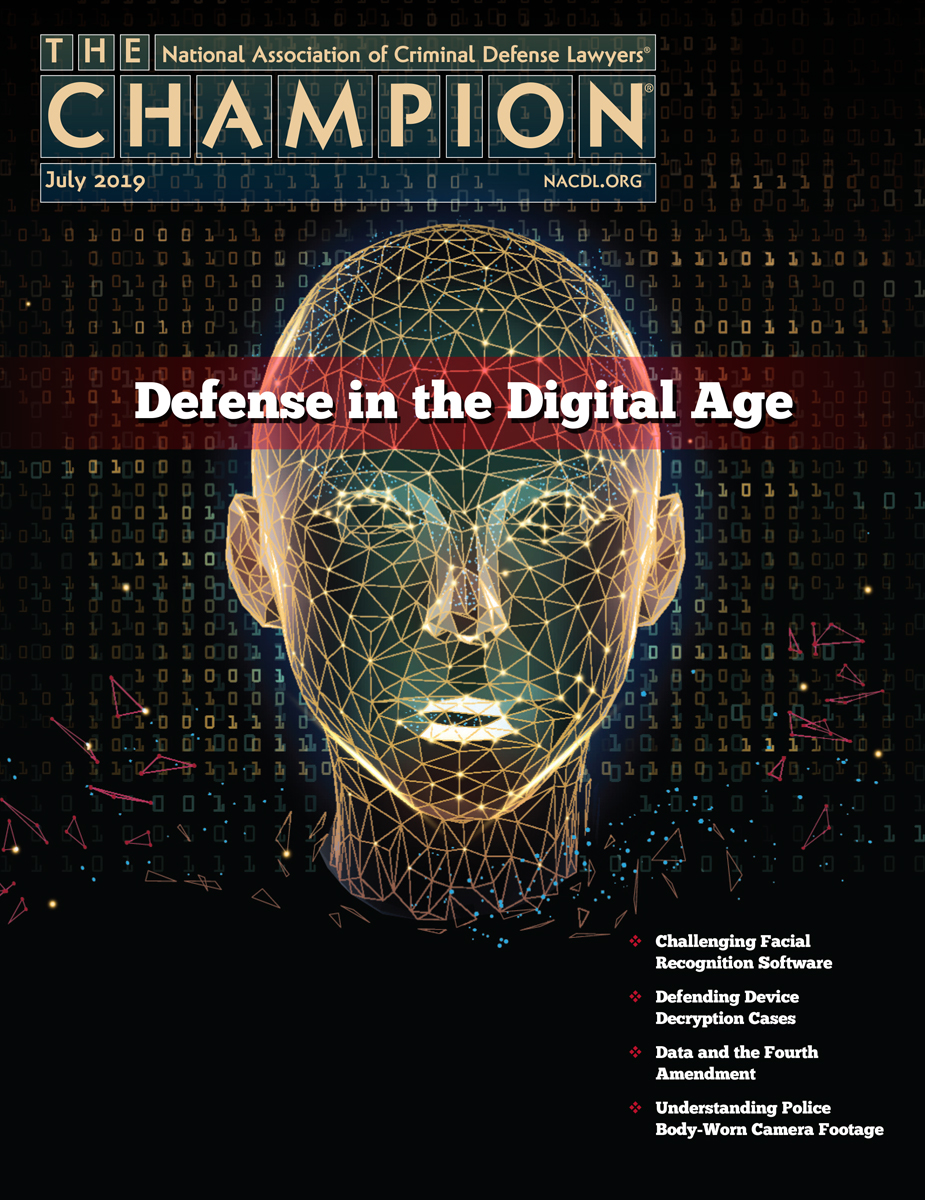July 2019

In this issue of The Champion, learn how to challenge facial recognition software and how to defend device decryption cases.
Articles in this Issue
-
Affiliate News
What events are NACDL affiliates hosting this month? Find out here.
-
Book Review: A Stone of Hope by Jim St. Germain with Jon Sternfeld
This month Tony Bornstein reviews A Stone of Hope by Jim St. Germain with Jon Sternfeld.
-
Book Review: Doing Justice: A Prosecutor’s Thoughts by Preet Bharara
This month Zachary Margulis-Ohnuma reviews Doing Justice: A Prosecutor’s Thoughts on Crime, Punishment, and the Rule of Law by Preet Bharara.
-
Challenging Facial Recognition Software in Criminal Court
If an image of a perpetrator exists on a cellphone camera, video surveillance, body camera footage or social media, law enforcement can use facial recognition software to attempt to identify the person in the photo. Defense attorney Kaitlin Jackson discusses the limitations of facial recognition, and she explains how to determine if police used facial recognition in a defendant’s case. Facial recognition software is difficult to challenge, but ways exist to attack its reliability.
-
Defending Device Decryption Cases
When law enforcement officers have a warrant to search a phone or digital device that they cannot access or decrypt, they may turn to the courts to compel the device’s purported owner to enter or produce the decryption key – typically a passcode, fingerprint, or faceprint. Case law on “compelled decryption” is sparse. Michael Price and Zach Simonetti address the technology behind encryption, describe the current state of the law, and suggest strategies for any lawyer seeking to challenge a compelled decryption order.
-
From the President: Beyond Batson: Challenging Systemic Racism at Every Level
Statements, practices, and even policy manuals establish that purposeful discrimination to exclude potential jurors based on race persists among prosecuting offices nationwide.
-
NACDL News: Fourth Amendment Center Releases Compelled Decryption Primer
NACDL News for July 2019
-
NACDL News: NACDL Calls for Tennessee to #TestTheDNA in the Sedley Alley Case
NACDL News for July 2019
-
The Details Beyond Body-Worn Camera Footage
Police body-worn camera footage can be inconclusive at best and misleading at worst, and thus it is imperative that the defense community understand the key technical features of body-worn camera systems. For example, police body-worn cameras automatically save the 30 seconds of footage prior to the officer activating the camera. Moreover, other available data kept by camera systems could reveal which officers reviewed the footage and when, and who marked the video for deletion.
-
The Fourth Amendment and Data: Put Privacy Policies in the Trial Record
In cases where the government has accessed data about a defendant that was subject to a phone company or internet service provider privacy policy, that data was something that belonged to the defendant. When the data was seized and then searched, it affected a real legal interest held by the defendant. Defense counsel should put the privacy policies and terms of service statements of such providers into the trial record. It creates a foundation for arguing that defendants have property rights in their digital papers and effects.
-
We, the Jury: Don’t Leave Judges and Jurors Alone
Messages from a jury to a judge should be disclosed to counsel. Counsel should be afforded an opportunity to be heard before the trial judge responds.
